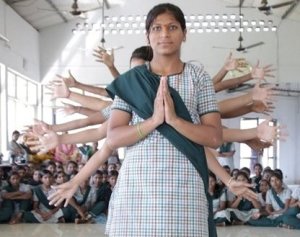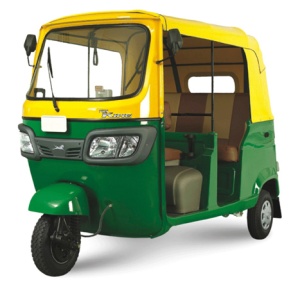This is copied from http://maggiemcneill.wordpress.com/2014/05/13/guest-columnist-molli-desi-part-two/
Guest Columnist: Molli Desi (Part Two)
May 13, 2014 by Maggie McNeill
This is the second part of the story of Molli Desi, a young Indian woman abducted into a “rescue center” under the excuse that her sex worker friends might “traffick” her. If you missed the first part yesterday, I urge you to go back and read it first before continuing.
At the “rescue” centre (which we only thought of as a “detention” centre) we were told that the NGO had custody papers for us from a court, and that we could not leave. I think it is important to understand why we are held incustody rather than given our freedom after we are “rescued”. Most anti-trafficking programmes must have what are called the “Three Ps”: Prevention, Protection, and Prosecution; without cases the NGOs cannot meet their prosecution quotas, and without women and girls in their centres they cannot meet their “protection” quotas. Many of these NGOs are not rights-based at all, but rather prioritise prosecution of traffickers; they must therefore detain sex workers under “safe custody orders” so as to force them to testify in court. Thisdetention can last many years because the court process is so slow, so thetrafficker can get bail and live free while the “victim” is held in centre or even prison. If women or girls run away, the NGO claims they were kidnapped by traffickers. In reality, though, it is the NGOs who are the real traffickers; sex workers and other women they capture are a commodity that they buy and sell. To get money from USAID they must promise to be anti-prostitution, and to get money from other donorsthey use women they have captured to put on shows. The women are even given false ages to make it look like they are very young; they told the court and donors that I was 12 years old though I was actually 17, and one woman of 23 was said to be 16.
To get money from USAID they must promise to be anti-prostitution, and to get money from other donorsthey use women they have captured to put on shows. The women are even given false ages to make it look like they are very young; they told the court and donors that I was 12 years old though I was actually 17, and one woman of 23 was said to be 16.
 To get money from USAID they must promise to be anti-prostitution, and to get money from other donorsthey use women they have captured to put on shows. The women are even given false ages to make it look like they are very young; they told the court and donors that I was 12 years old though I was actually 17, and one woman of 23 was said to be 16.
To get money from USAID they must promise to be anti-prostitution, and to get money from other donorsthey use women they have captured to put on shows. The women are even given false ages to make it look like they are very young; they told the court and donors that I was 12 years old though I was actually 17, and one woman of 23 was said to be 16.
The detention house was not like the orphanage; the women and girls were scared and cried a lot. Several of them were not even sex workers, but rather migrants without papers; the NGO said they were “at risk” for trafficking. Most of the girls there with me were not sex workers; some had been raped while in domestic service. Everyone wanted to leave but many had nowhere to go, because the NGO had told their family and home village that they had been trafficked and raped. They do this to stop you from being able to go home, because they know your family will reject you for being a sex worker; it’s a way to discourage running away from the centre. This is why it is so important to give a false name and say you are from a faraway place when they catch you (which we did); it also helps to prevent anyone from filing a First Instance Report (FIR).
After a couple of days, the NGO demanded we undergo gynecological examinations and take HIV tests, but I refused to undress or to let them take blood. They would not respect my wishes, so I had to physically fight them; the NGO director hit me in the face with her hand, and I now have a scar on my forehead from her heavy ring. Each day we had to do activities in the centre, and we were not allowed to go outside. One day two white donor women came to visit the centre, and we were forced to sing and dance for them and let them take photos of us; when the staff realised I could speak English they took me upstairs and locked me in a room until the women had left. After we had been in the centre for a week, we started planning our escape, but our hidden phone needed credit and charge; though we had the money I had hidden, we did not have any contact with outside. We learned from other women who had been there a while that night security would exchange food and candy for sex, so we propositioned one night guard and in exchange for oral sex and money he eventually brought us a phone charger and phone credit. We were then able to contact our sisters in the orphanage, who had been very worried about us; the orphanage had filed an FIR on us because they thought we had been kidnapped and trafficked.
 After another few more days of oral sex with the night guard and some of his friends (whom he was charging money for access to us), we arranged for two of our sisters to come to the centre in an auto-rickshaw, late at night (this was during a festival time). We then used a metal bar we got from the guard to prise open the metal cage on our window, lowered ourselves onto the annex roof, and got down to the garden. Unfortunately, the main gate was still locked and we could not get to the street, so we rang our sisters outside and they convinced the auto-rickshaw driver to break the lock and let us out, whereupon we all ran to the auto-rickshaw and fled away into the night. We did not go straight home, but stopped for iftarfood; it tasted so good, and we were all so happy to be free we laughed and cried all the way home. When we got home everyone was so pleased to see us, and we immediately washed our clothes and had showers; I then slept for almost a whole day. We told our director that we had been lured away by miscreants and eventually escaped from their hideout, so she wrote a report and the FIR was cancelled. We eventually heard from a woman who escaped the detention centre later that the staff had claimed traffickers had kidnapped us from the centre, and that we had probably been sent to Mumbai.
After another few more days of oral sex with the night guard and some of his friends (whom he was charging money for access to us), we arranged for two of our sisters to come to the centre in an auto-rickshaw, late at night (this was during a festival time). We then used a metal bar we got from the guard to prise open the metal cage on our window, lowered ourselves onto the annex roof, and got down to the garden. Unfortunately, the main gate was still locked and we could not get to the street, so we rang our sisters outside and they convinced the auto-rickshaw driver to break the lock and let us out, whereupon we all ran to the auto-rickshaw and fled away into the night. We did not go straight home, but stopped for iftarfood; it tasted so good, and we were all so happy to be free we laughed and cried all the way home. When we got home everyone was so pleased to see us, and we immediately washed our clothes and had showers; I then slept for almost a whole day. We told our director that we had been lured away by miscreants and eventually escaped from their hideout, so she wrote a report and the FIR was cancelled. We eventually heard from a woman who escaped the detention centre later that the staff had claimed traffickers had kidnapped us from the centre, and that we had probably been sent to Mumbai.
My main accusation against the “rescuers” is that everyone presumes that they take proper care of those they “rescue”; in truth, however, the NGOs havecomplete power over their victims. There is no proper protection for women and girls they detain, so it is very common for centre staff to rape them. Though the Government is supposed to supervise orphanages and centres, the reality is that it lacks the capacity to do so; all NGOs know there is inadequate supervision, and many of them resist external accountability and will pay the few inspectors who do come to give them clean reports. This power and impunity from consequences invites abuses of all kinds, such as the way the night guard charged his friends for sex with us; personally, though, I did not find the sex trading for telephone credit and food nearly as bad as the way the women senior staff acted toward us. They want sex workers to be forced into domestic work or garment factory work, or to be married to low caste men; they know they are trapped inside patriarchy and resent our determination to live free. You can find many “rescue” stories on the internet, but most of them are usually mediated by the “rescuers”; if you read my account here and the various links I have included, you will hear another truth.


